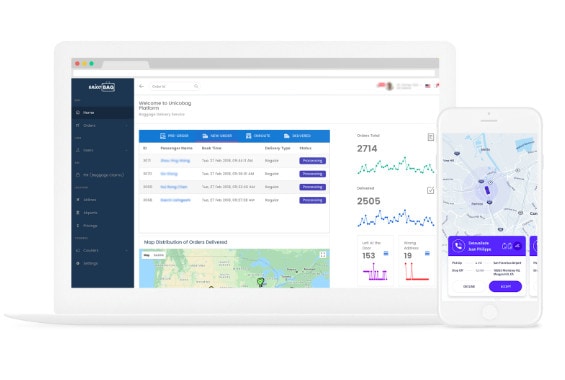Unicoaero Finds Opportunity In Lost Airline Baggage
Share

APEX Insight: Just over two and a half years after launching, Unicoaero now delivers mishandled baggage for 16 airlines, including Emirates, All Nippon Airways, Air China and Singapore Airlines, at 12 airports around the world. APEX Media spoke to Ziko Atamuloev, the company’s founder, to learn more about Unicoaero’s journey so far.
If you fly often enough, the odds are that eventually your checked baggage won’t arrive on the carousel at your destination. In 2017, the rate of mishandled baggage was 5.57 per 1,000 checked items. Ziko Atamuloev founded Unicoaero to solve this problem, which he describes as the “biggest pain points for airlines, couriers, and passengers.”
Unicoaero is the 12th company founded by serial entrepreneur Atamuloev. In 2016, he came up with the idea while operating another of his ventures, a shuttle company, which works with the US State Department to pick up students from airports on behalf of schools and universities and take them to their hotels.
“I used to go to the airport a lot to check out the operations and on one of my visits I saw a lady flying with Saudi Arabian Airlines at Washington Dulles International Airport,” he said. “She asked an airport employee to help her grab bags and take her to the parking lot and she gave them a $40 tip, which got my attention. I thought, ‘Okay why don’t we just check out bags and deliver them to the parking lot and then on to their homes? Do an airport to home door-to-door service.’ I didn’t know that any other companies were offering this kind of service at the time.”
“What we heard from Emirates is that by using our product, the number of calls to call centers reduced by 90%.” – Ziko Atamuloev
Atamuloev shared the idea with a friend who worked for South African Airways. His friend said that he should instead focus on delivering mishandled baggage because it was something that airlines were struggling with. With this in mind, Atamuloev built a website with the help of offshore developers in Indonesia.
Shortly after, he presented to Etihad Airways a trackable Uber-style web-based platform for delivering mishandled baggage to customers’ homes. “[Etihad’s] baggage manager said he was in a bad situation with bags and that he would love to try it. The agreement stipulated that he could try it free for one month and if he liked it, Etihad would continue using it for a fee. “He used it for one month, liked it, and continued using it.”
Two weeks later, Virgin Atlantic approached Unicoaero with a desire to use the product. In just over two and a half years since launching, the company now delivers mishandled baggage for 16 airlines, including Emirates, All Nippon Airways, Air China and Singapore Airlines, at 12 airports around the world. One of the reasons for the company’s rapid growth is the implementation of IATA Resolution 753 on June 1, 2018. The resolution requires IATA member airlines to track baggage from the moment a passenger hands their items at check in, until they are returned back to them. This is why Atamuloev says “when we provided [our trackable solution], every airline was excited about it.
So far, Atamuloev says customer feedback has been very positive. “What we heard from Emirates is that by using our product, the number of calls to call centers reduced by 90%. Now that passengers have notifications and tracking just like Uber, they don’t have to call the office or station and ask the same questions all the time.”
The likes of JetBlue Ventures are sold on Unicoaero’s future and were among the early investors. One of the reasons is because Atamuloev’s vision for the company’s growth in the next five years extends beyond delivering mishandled baggage. “We will still be working on B2B, delivering mishandled baggage, but at some point, I know that the numbers are going to be really low. New technologies and people out of Silicon Valley will solve the problem [of mishandled baggage],” he said.
“In the next 10 to 15 years, airports won’t look the same as they do now.” – Ziko Atamuloev
“The reason [JetBlue Ventures] invested is because of door-to-door delivery. In the next 10 to 15 years, airports won’t look the same as they do now. Unfortunately, 35% of an airport’s infrastructure is designed for bags and the industry is expecting billions more passengers by the 2030s, so can these buildings handle all this traffic?”
Atamuloev says there are two solutions to addressing this problem. The first, he says, involves building new airports from scratch, an undertaking which he thinks would be too costly. He suggests that a more viable alternative would make baggage check-ins a door-to-door experience done outside of the confines of an airport to free up existing space within the terminal buildings. “I see this as a very exciting challenge and I think it’s going to happen one day. If we aren’t going to do it, then I’m very certain someone else will do it.”


